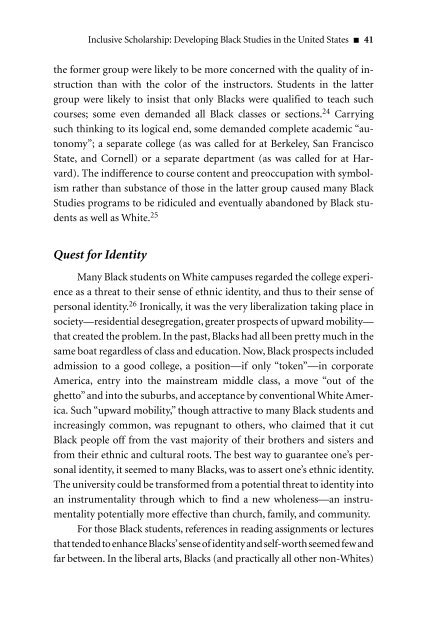Inclusive Scholarship: Developing Black Studies - Ford Foundation
Inclusive Scholarship: Developing Black Studies - Ford Foundation
Inclusive Scholarship: Developing Black Studies - Ford Foundation
Create successful ePaper yourself
Turn your PDF publications into a flip-book with our unique Google optimized e-Paper software.
<strong>Inclusive</strong> <strong>Scholarship</strong>: <strong>Developing</strong> <strong>Black</strong> <strong>Studies</strong> in the United States 41<br />
the former group were likely to be more concerned with the quality of instruction<br />
than with the color of the instructors. Students in the latter<br />
group were likely to insist that only <strong>Black</strong>s were qualified to teach such<br />
courses; some even demanded all <strong>Black</strong> classes or sections. 24 Carrying<br />
such thinking to its logical end, some demanded complete academic “autonomy”;<br />
a separate college (as was called for at Berkeley, San Francisco<br />
State, and Cornell) or a separate department (as was called for at Harvard).<br />
The indifference to course content and preoccupation with symbolism<br />
rather than substance of those in the latter group caused many <strong>Black</strong><br />
<strong>Studies</strong> programs to be ridiculed and eventually abandoned by <strong>Black</strong> students<br />
as well as White. 25<br />
Quest for Identity<br />
Many <strong>Black</strong> students on White campuses regarded the college experience<br />
as a threat to their sense of ethnic identity, and thus to their sense of<br />
personal identity. 26 Ironically, it was the very liberalization taking place in<br />
society—residential desegregation, greater prospects of upward mobility—<br />
that created the problem. In the past, <strong>Black</strong>s had all been pretty much in the<br />
same boat regardless of class and education. Now, <strong>Black</strong> prospects included<br />
admission to a good college, a position—if only “token”—in corporate<br />
America, entry into the mainstream middle class, a move “out of the<br />
ghetto” and into the suburbs, and acceptance by conventional White America.<br />
Such “upward mobility,” though attractive to many <strong>Black</strong> students and<br />
increasingly common, was repugnant to others, who claimed that it cut<br />
<strong>Black</strong> people off from the vast majority of their brothers and sisters and<br />
from their ethnic and cultural roots. The best way to guarantee one’s personal<br />
identity, it seemed to many <strong>Black</strong>s, was to assert one’s ethnic identity.<br />
The university could be transformed from a potential threat to identity into<br />
an instrumentality through which to find a new wholeness—an instrumentality<br />
potentially more effective than church, family, and community.<br />
For those <strong>Black</strong> students, references in reading assignments or lectures<br />
thattendedtoenhance<strong>Black</strong>s’senseof identityandself-worthseemedfewand<br />
far between. In the liberal arts, <strong>Black</strong>s (and practically all other non-Whites)

















